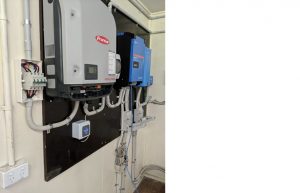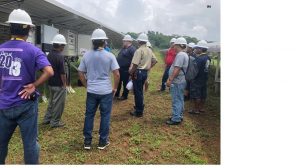SEIAPI is not a training institute however it promotes the development of quality training for the Sustainable Energy Industry in the Pacific.
In December, 2022, SEIAPI has released the SEIAPI Training Plan for the Pacific Islands. The early sections of the document references numerous training reports, proposals and discussion papers produced in recent years and provides an overview of sustainable energy training activities undertaken in the last 10 years. The plan identifies the actions required to build capacity within the Pacific Island Countries and Territories with PSETC acting resource to support training being provide in other countries . The initial focus is on technical training for the design and installation of grid connected PV systems, off grid systems and grid connected battery systems. However SEIPAI will work with stakeholders and the PSETC to develop new courses over the next few years.
The plan is available here.
In 2011, we worked with the University of the South Pacific (USP) to host the inaugural meeting, which led to the formation of the Renewable Energy & Energy Efficiency Training Competency Standards Advisory Committee and associated technical committees. (Download ToR of the Committee). The USP then acted as chair of the advisory committee and SEIAPI took the role of managing the technical committees.
In order to obtain provisional certification, individuals must attend training courses which use the competency standards developed and approved by the Renewable Energy & Energy Efficiency Training Competency Standards Advisory Committee as the basis for their curriculums.
From 2018 – 2020, as part of the SEIDP (Sustainable Energy Industry Development Project), SEIAPI/PPA updated/replaced old competency standards which are more accurately known as unit standards under Pacific Register of Qualifications and Standards (PRQS). This work involved the demarcation of PV systems through levels. A Technical Advisory Committee was formed including Solar Engineers, Trainers and Solar Consultants from various countries in the Pacific. A number of unit standards were developed which were then approved by the Technical Advisory Committee. Upon submissions to EQAP and a thorough vetting the approved unit standards have been accredited under PRQS.
The unit standards accredited are:
- Designer of Grid Connected PV Systems
- Installer of Grid Connected PV Systems
- Designer of Off Grid PV Power Systems – DC Load SHS
- Designer of Off Grid PV Power Systems – Stand-alone Solar Systems
- Designer of Off Grid PV Power Systems – Hybrid Power Systems
- Installer of Off Grid PV Power Systems – DC Load SHS
- Installer of Off Grid PV Power Systems – Stand-alone Solar Systems
- Installer of Off Grid PV Power Systems – Hybrid Power Systems
- Maintainer of Off Grid PV Power Systems – DC Load SHS
- Maintainer of Off Grid PV Power Systems – Stand-alone Solar Systems
- Maintainer of Off Grid PV Power Systems – Hybrid Power Systems
- Operator and Maintainer of Grid Connected PV Systems
- Select and Install Solar Water Pumping Systems
- Select and Install Solar Water Heating Systems
- Implement Energy Efficiency in Residential and Small Commercial Applications
- Design Micro hydropower systems
- Install Micro hydropower systems
- Design Grid Connected PV Systems with Batteries
- Install Grid Connected PV Systems with Batteries


Currently, the courses that are accredited by SEIAPI are the CEC (Australian) accreditation courses offered by SEIAPI’s Training Provider, Global Sustainable Energy Solutions Pty Ltd (GSES) (www.gses.com.au) and the Grid Connect course offered by the Micronesia Community College.
The following courses are currently available through GSES:
- Grid Connected PV Systems Design and Install
- Stand Alone Power Systems Design and Install